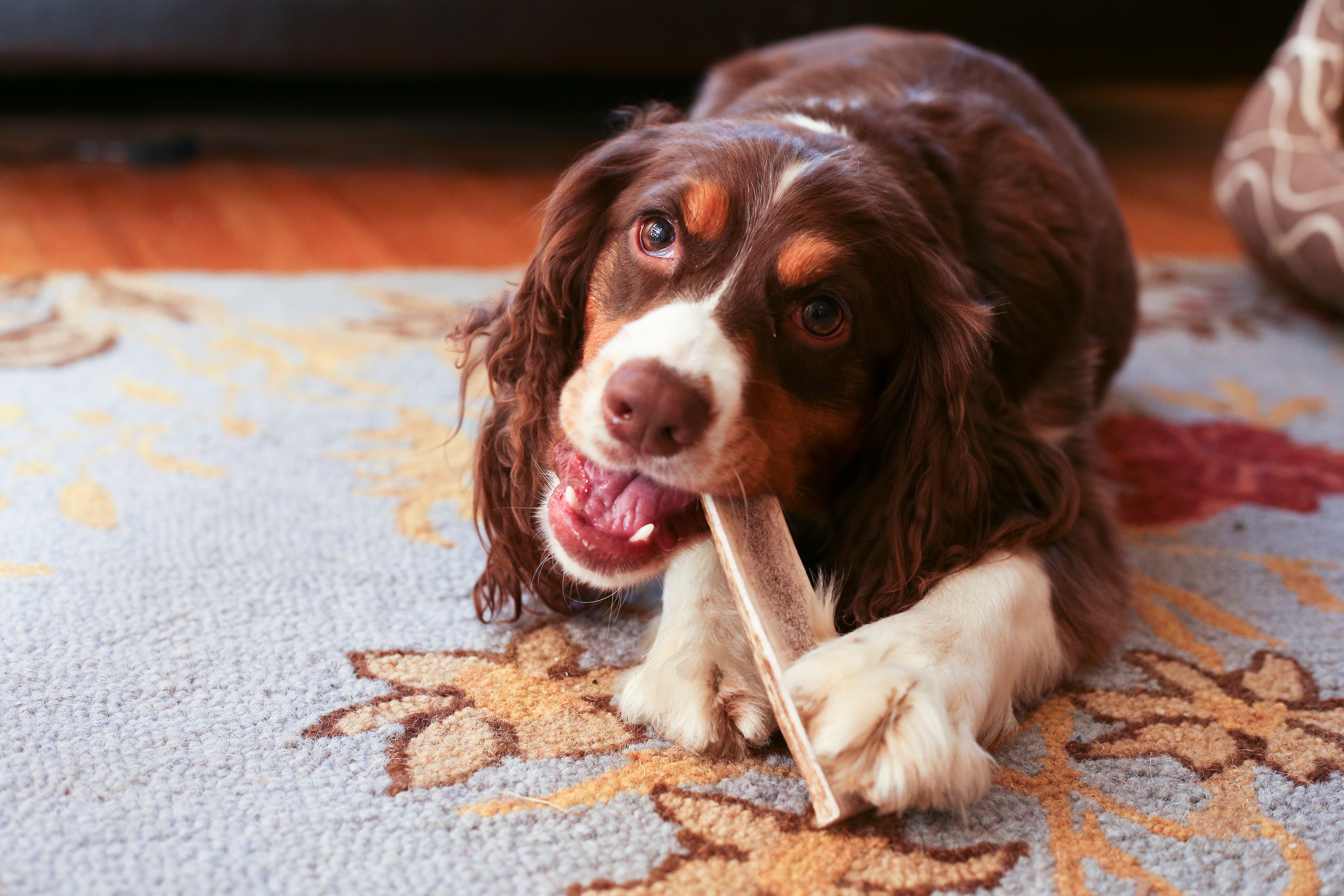"Sticks are great toys in your fur-baby’s eyes."
There is no doubt that dogs love sticks. You probably notice this whenever you play fetch with your dog. Even when walking your dog in the park or running with them in the woods, you have probably noticed your pooch dragging along a stick with them. But have you ever wondered why dogs like sticks? What is with sticks that make our dogs want to fetch, carry on walks, bring home, and chew on them? Are sticks safe for our fur-babies to gnaw?
In this article, we will discover why do dogs like sticks and what medical concerns to worry about if your fur-baby is an avid stick-lover.
Reasons Why Dogs Love Sticks
We’ve gathered the most common reasons why sticks seem to be that appealing to fur babies.
Sticks are nature’s dog toys. One of the reasons why dogs love to fetch and chew on sticks, according to Vet Explain Pets, is because sticks are great toys in your fur-baby’s eyes. And sticks as toys are fun and stimulating for your dog.
Dogs naturally love chasing, catching, gnawing, and tearing toys apart. They love to fetch sticks because they enjoy playing. And just like any other dog toy, sticks provide hours of fun to our dogs. And they can chew on them for hours without getting bored.
Sticks = playtime. Almost all dogs love a good old game of fetch with a stick! In wide outdoor spaces, several dogs will carry sticks with them to initiate that they want to play fetch with you! They will usually place the stick in front of you for you to throw it.
They bring out a dogs’ innate hunting instincts. Dogs have natural hunting and foraging instincts and sticks allow them to make use of these drives. This is probably one of the reasons why your fur-baby loves finding, carrying, fetching, and tearing sticks.
Sticks resemble bones. Sticks are similarly long and look like the shape of a bone, making them seem appealing to dogs. In addition to this, dogs also have an excellent sense of smell. Their sense of smell can urge them to sniff, lick and taste anything that they find amusing.
Sticks smell and taste earthly and musky and dogs find that interesting. Moreover, the texture of sticks is also something to consider as it is also a part of why dogs like it so much. Dogs find a stick’s wooden spongy-like texture perfect for gnawing.
They help relieve mouth problems. Toothaches and sore gums give dogs the desire to chew on things to temporarily relieve the pain—and yes! They find sticks ideal!
Sticks and the praises that come with it. Dogs may also feel positively rewarded by the praise they get from their fur parents whenever they fetch and carry home sticks and will therefore continue these behaviors if they begin associating it as something a good doggo would do!
But Is It Safe for Dogs to Play with Sticks?

It’s perfectly fine for dogs to play with sticks as long as they don’t start chewing on them because it may cause them serious harm. Although most dogs spit out pieces of the stick as they chew, some may however accidentally swallow them. Many medical issues could arise from ingestion of stick pieces, running with sharp-edged sticks, and chewing an infested and the wrong type of stick.
Here are the most common medical issues that may arise:
- Splinters may get stuck to your dog’s mouth. We all know how painful having a splinter in one’s finger is. Now, imagine how it would feel for your dog to have a splinter getting stuck in their mouth. Splinters can also cut your fur-baby’s gums and tongue and can also puncture his palettes.
- Splinters and broken twigs may also scratch or pierce through your dog’s throat causing major injury and can also potentially lead to infection.
- Swallowed bits of wood can also result in digestive tract irritation, internal bleeding, and even intestinal blockage which could be life-threatening and will often require surgery to be removed.
- Running with a sharp-edged stick can cause impalement to your dog which can also be life-threatening.
- Ingestion of fungus, parasites, and other pathogens from an infested stick could cause various diseases to your dog.
- According to the American Society for the Prevention of Cruelty to Animals, many trees like Apple, Walnut, Black Cherry, Beech, Yew, and Horse Chestnut trees are considered toxic plants for dogs which can put your dog’s health in danger if by any chance they had picked up and chewed on a fallen twig from one of the toxic trees mentioned.
Alternative to Sticks: Gnawtlers®
Providing your dogs with a safe chewing alternative is the key to helping them break their stick hunting and chewing habits. Stopping them from chewing sticks doesn’t have to end their fun though, as we could just replace the sticks with a safer chew.
One of the great alternatives to sticks are Gnawtlers®. Gnawtlers® are premium deer and elk antlers for dogs are pawsitively the best! They are exceptionally great for dogs who love to chew and will leave your dog with a one-of-a-kind gnawing experience. Gnawtlers® do not easily break or splinter, so that gives you peace of mind!

"Gnawtlers® are premium deer and elk antlers for dogs."
Additionally, Gnawtlers® are jam-packed with nutrients. The marrow on the inside of our elk antler chews is filled with calcium, phosphorus, manganese, and zinc. Your dog will gain added nutrients just by chewing!
Moreover, there’s no need to completely stop your fur-baby from their chewing behavior, only destructive chewing! After all, chewing offers your dog a lot of benefits. Thus, providing them with a chew, Gnawtlers® in particular, becomes the best option.
Benefits of Gnawtlers®
Aside from all the reasons why dogs love to chew stated earlier, there are a number of benefits your dog could get from Gnawtlers®. And though these Gnawtlers® are well known for improving your dog’s dental health, they are also stress and anxiety relief for many dogs, reduce dogs’ destructive chewing and provide your fur baby a positive outlet for mental stimulation for a happier, healthier life.









